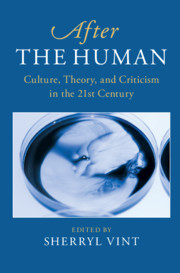Book contents
- After the Human
- After Series
- After the Human
- Copyright page
- Contents
- Contributors
- Acknowledgments
- Introduction
- Part I After Humanism
- Part II New Objects of Enquiry
- Part III Posthumanities
- Chapter 11 More-than-Human Biopolitics
- Chapter 12 New Materialisms
- Chapter 13 Speculative Realism
- Chapter 14 Race and the Limitations of “the Human”
- Chapter 15 Speculative Fiction
- Chapter 16 Aesthetic Manipulation of Life
- Collective Works Cited
- Index
Chapter 11 - More-than-Human Biopolitics
from Part III - Posthumanities
Published online by Cambridge University Press: 26 November 2020
- After the Human
- After Series
- After the Human
- Copyright page
- Contents
- Contributors
- Acknowledgments
- Introduction
- Part I After Humanism
- Part II New Objects of Enquiry
- Part III Posthumanities
- Chapter 11 More-than-Human Biopolitics
- Chapter 12 New Materialisms
- Chapter 13 Speculative Realism
- Chapter 14 Race and the Limitations of “the Human”
- Chapter 15 Speculative Fiction
- Chapter 16 Aesthetic Manipulation of Life
- Collective Works Cited
- Index
Summary
Posthumanist scholarship has challenged and critiqued some of the conventional understandings of Foucauldian biopolitics. The question of the posthuman goes beyond the focus on anti-humanism and is posed within the reconfiguration of life itself: how can life be governed when the boundaries of life are shifting, when inanimate, nonhuman, and posthuman forms and their novel ontologies have entered the specter of qualified life? This question is heightened in the age of the Anthropocene, where the destruction of the natural world is evidenced by the burden humans have put on natural resources, land, soil, waters, air, and nonhuman life, including plants and microbes. In this essay, I distinguish four different scholarly engagements with the posthuman and the biopolitical—capital, law, relational-material, environmental—that push the analytics of a Foucauldian biopolitics to its boundaries, and that lay bare the limits and tensions of biopolitics arising within these areas of study.
Keywords
- Type
- Chapter
- Information
- After the HumanCulture, Theory and Criticism in the 21st Century, pp. 161 - 176Publisher: Cambridge University PressPrint publication year: 2020
- 1
- Cited by

